- Home
- Saul Tanpepper
Leviathan: A Short Story About the End of the World
Leviathan: A Short Story About the End of the World Read online
CONTENTS
LEVIATHAN
A word about Leviathan
Excerpt
The Last Zookeeper
‡ ‡ ‡
Care to share?
Copyright Notice
Acknowledgments
About the Author
Tanpepper Tidings Newsletter
(subscribe for exclusive access, pricing, giveaways and more)
www.tanpepperwrites.com
‡ ‡ ‡
LEVIATHAN
a short story about the end of the world
SUMMARY: A father and his child are haunted by the ghostly call of a sea creature presumed extinct for decades. Could the song be a sign of hope for a dying planet? Or its last lament?
by Saul Tanpepper
© 2016
All rights reserved (full notice)
[email protected]
(rv.160122)
Leviathan
The girl was exhausted after her long ordeal upon the sea, and her thoughts strayed as she prepared her meal. The things he had told her about names, that they belonged to a world which had died a long time ago, long before she came to be in it, troubled her. But after some reflection, she concluded that he was wrong on both accounts. Names were important things. They were all you had left when everything else was gone. They told the world who you were, even if that world were as empty and lonely as this one had become in the years since her mother left.
"Names do matter," she said aloud, as if expecting someone to challenge her. "And neither is the world dead."
Thus satisfied, she lay back against her pillow and listened to the fat of the meat bubble and spit upon the dying embers of the fire.
* * *
Father came from a long line of hunters. 'Twas what he always claimed anyway, that the father before him and the father before were all hunters just as he once was. Generations of them, one after t'other after t'other.
I asked him if that made me a hunter, too, though deep inside of me there was a terrible fear of knowing the answer.
But the truth, when he finally did relinquish it, was worse. He explained to me that he was the last of that clan, and he said that 'twas important I understood exactly what that meant. There are no more hunters in the world but for I, he told me, just as there are no more animals left to hunt. And it made me wonder what exactly I was, if not a hunter as he, for I had no way to describe myself other than to say I was his child.
'Tain't enough for you? he chided. Who else is there to explain yourself to?
His reasoning quieted my foolish tongue.
There is no one, he concluded. And he pulled me close so that I would know he was sorry for the roughness of his tone. Anyway, he explained, such things as names are useless contrivances. They have no purpose in an empty world. They belong to the dead and their dusty memories.
But if all that were true, then why did he insist on calling himself a hunter or reminding me that he was the only one left? Why did he still go out in the morning?
Old habits.
He would utter this bit to himself, though still loud enough for me to hear despite I hadn't asked him the question aloud. I figure he must've known 'twas in my mind to ask it and hoped that I wouldn't, because then he'd have to answer truthful, as he was accustomed to do.
Old habits and payments for old sins.
He'd draw on his worn jacket to protect himself against the unrelenting sun and take the food I had prepared and placed into a rickety pail for him. Out and down the cluttered beach to the small boat, pressed forward by the thin hand of the day and the promise of only his own wretched thoughts to keep him company.
I'd follow along in silence close behind, making sure to keep his footsteps inside the circle of my own shadow, my toes nearly touching his heels, as if 'twas a game of chase. Like I was the hunter and he the last animal.
And each time he clambered aboard to leave, I would hold my breath that the craft did not sink.
Sometimes the tiny boat rocked frightful-like and the gray water'd slosh up and over the sides and cover his feet, darkening the bottoms of his tattered trousers. But he'd steady it with his leathery hands and sit down upon the creaking wood before heading out onto the tarry sea. Sometimes his leaving was like a dream. Blink too long or look away for a moment and all there'd be left was the white curls of mist spinning away and the memory of his kiss upon my cheek.
I never noticed before, but now I see how my breaths keep the same rhythm as the paddles, catching in my chest with each dip. Just as they do now.
Now I have put myself upon the selfsame sea.
Now I am searching.
The blades of the rotting wood pierce the water's skin and make it bleed in all the different hues, in colors which have all but faded from the world. Watching the streaks as he drew away each morn, I always felt as if 'twere my own flesh being rent and bleeding. But these cuts I make leave no lasting scar. They heal up behind me as I row. Not like the wounds the world cut into my own skin just by existing in it; nor like the wounds on his. Our bleeding, father told me, is the price we pay for surviving.
Out he went, on his feckless hunts for the creatures which were no more. With naught but his sticks and nets, his eyes and hands. His going told me he refused to believe they were truly gone, not as he claimed.
There had not been any animal seen on the land in more than thirty years. That is what he told me, though I had difficulty understanding the number and its import. Thirty winters, he said, but the meaning of this was just as impossible for me to understand.
So he took me to the withered fence posts stuck into the ground along the front of the fallen down mansion, and there we counted the left behind pieces still standing using all of his fingers and mine, as well as some of my toes and his. From first to last he showed me the distance they spanned. All that way was thirty.
Yet not even then did the number impress itself upon my mind.
Since long before you were born, he finally told me. Older'n you and almost as old as me. And when I asked how old I was, he held up just the fingers on both of his hands this time, excepting the two which the world had taken from him. But neither did that make the meaning any less obscure in my mind, so he just gave up, and we set our feet back toward home.
He confessed that he could not possibly know for absolute certain the number of years. The world is a big place, he admitted. Some may have survived a little longer.
The last sea creature the world had ever seen was the diseased fish he caught the day my mother washed ashore all those years ago. She had come adrift in her own boat, the bow nudging the gravel in the very same cove where our house has always stood. She arrived upon the last swells of the brackish sea, when there still was wind to stir the waters and push about a vessel of any size. They ate that last fish together, pulling the flesh from the bones with their teeth. And then, he said, they made me.
We were the last two of our clan, he told me. The last hunters. Now he was the last, and she was gone.
So, I suppose that makes me the last of my clan, too, whatever it might be. The last of all the clans.
He tried at different times to tell me about other numbers. In my present fevered state, I can only remember one— the number of the low stubs of the trees we once visited in the burnt forest beyond the ghost town. Each trunk had once held as many branches as there were trees, and each branch as many leaves. He called the number boundless, which I knew to be much larger than his thirty, and he'd drawn the strange jagged shapes of the leaves in the dirt and told me that there had once been more animals than all the leaves on all the bran
ches on all the trees in all the forests like mine. Each animal was like one of those leaves. Then he pointed up to the skies and said that each leaf was like one of the stars above.
So many? I remember jumping up then because I thought I was beginning to understand. 'Tis possible there might still be one left, I said, some animal somewhere on the land or in the sea.
In all my searching, I have seen none.
Yet he never stopped hunting for them.
Each time I waited for his return, expecting him to have found something to prove himself wrong. Sometimes 'twas in the evening of the same day and sometimes several later. I never would know when to expect him back, only would know once the boat appeared like a mote upon the far edge of the water with the giant waxy blob of the sun melting behind him. And each time he drew the vessel onto the gravel and I saw his eyes, how empty they were, as empty as his stomach must be, he would shake his head so that I would know he had found nothing.
He'd hand me up the pail, and it'd be filled with the bleached shells of the long-dead sea creatures he'd plucked up off the beaches he had checked, all their strange and terrifying shapes rattling about inside as if talking to each other in a language I did not understand. And I could not imagine what they must have looked like when they once lived, only see what was left of the creatures of the world that had been but was now occupied by naught but two people, him and me, and one of us without name and t'other without purpose.
We would eat the salted potatoes I had gathered, extracted from the hard clay in the tired hills above our shore. I would flavor them with the boiled bones of those long dead creatures, and we would sit in silence, or near silence, so few were the words passing between us. And we would watch the sky forsake the sun till 'twould slice itself against the sharp edge of the colorless world and then slip into the dark space beyond.
Nighttime was the time for speaking.
You don't know the taste of flesh, he once told me. You don't understand the sweetness of meat, why we hunted them all, down to the very last one, land and sea and air. No fungus or tuber could ever have the same effect on the tongue or the body as the flesh of a creature slain. Blessed are you, free from the curse of knowing.
Is that why you go? I asked, finally putting the question to him direct. Why you go hunting ghosts. Is it because you yearn for the taste?
He was silent for a long time before answering: Maybe. Or maybe to know before I die that there are more than just ghosts and skeletons left to find. He sighed and slowly lowered himself down to his sleeping mat and crooked an arm over his forehead and stared up at the shadows in the rafters. The boards creaked beneath his weight, and his feet scraped at the bare floor. His joints crackled and popped like the fire in the stone circle between us.
If only I could see just one more, he whispered, and then drifted off to sleep, leaving me to lie awake and watch the dancing shadows and measure the passage of time by the rhythm of his snores, which I felt right into my bones. The whole time I could never fathom the true depth and meaning of his yearning.
One such night his voice changed, took on a whole new tone which I had never heard before, and I asked him what 'twas.
A song your mother sang, he said at long last, apologizing for his tears. He seldom cried. A lullaby to annabeth, he said. But when I asked him what an annabeth was, he said: Nothing. A thing from a long dead world. From another clan.
'Twas the strangest and most beautiful thing I'd ever heard, and, truthfully, the most terrifying. But though I wished to hear the song again, he never repeated it for me, and I didn't ask for him to.
Annabeth. I know in my heart that it is a name. It echoes in whispers inside my head, beckoning, yearning. A name that sounds like it wants to fly away. Annabeth. Was it my mother?
The drips from the paddles punctuate each note of that song in my mind, while the words draw me further away from my shore, and I wonder how I will ever find my way back, now that I am lost.
He told me how all the animals died, beginning slowly at first, one by one and then by twos and threes. Then more and more, faster and faster. He told me numbers larger still, but like the stones on the beach, they were too large for me to properly weigh. He called it extinction, and again 'twas a word which held no meaning in my experience, as I had nothing to measure it against. To not have something that was never there to begin with was impossible for me to imagine.
Annabeth . . . annabeth.
One night I thought I heard him singing the song, just a note or two, but beneath the sound of it came the rumble of his snores, so I knew 'twas not him. Before I could stir, the notes faded away like the morning mist. I didn't make any mention of it to him the next day, though I did study his face for any clue that he had heard it. There was none, and so I carried on after that believing that I was mistaken and must somehow have dreamed it.
Days passed. Father went out on his boat, and I gathered potatoes and fixed our little house, which was always falling down or apart in some way and so required constant intervention. There were no winds to knock the walls down, as there were none strong enough to even rile the sea, winds that came in such things as had once been called storms. The pieces of our home simply rotted away in the sun and fell, sometimes with a clatter, sometimes as noiselessly as a teardrop falls from a cheek. And I would have to pick them up and prop them back into place, or else replace what wouldn't stay.
Yet more days went by, countless numbers of them, and I forgot about the song and the dream till it came again in the hollow belly of the night. This time I was sure I had woken up full and clear, and so knew that the singing wasn't inside of my head but without. And 'twas a different song than I remembered as well, without words or rhythm, yet just as beautiful. On that night, it lasted so long that I fell back asleep before I had a chance to hear its end.
Despite my certainty, I still did not tell him about it. There had been a quality in the sound which frightened me terribly in the full brightness of day, as if 'twas the ghost of this annabeth come to lure him away from me. I knew 'twas nonsense of me to think of it in such a way. It might just as easily have been t'other way round, an angel announcing an end to his search. But when you are supposed to be the last living things with a voice in the world and you hear another that is not familiar, it makes your heart beat faster and clutches at the breath inside your chest with fingers of cold stone that won't let go.
The song came again several nights later, skipped two, then returned for the next three. And with each coming the fear in my heart fell a little more away.
Father overheard me attempting to sing it one morning, though 'twas a poor effort and sounded most like a pained whimper than a song. Walking down to the water with his pail banging his knee, he turned and asked me if I was feeling ill.
It is the song for the annabeth. I thought I heard it t'other night, coming over the water.
He stopped and a whiteness came over his face. What did you say?
All of a sudden the fear returned and pierced my heart to hear the frightened tone of his voice, and I did not favor the rigid way he held his body. 'Twas nothing, I mumbled. I hoped he would dismiss me from the obligation of explaining, but he did not.
'Twas not nothing! Tell me! He bent down and placed his hands on my arms, wrapping his long bony fingers all the way round them and squeezing till my struggles ceased. His face softened, but there was still that look of fear in it. Please.
So I told him what I had heard and the whiteness slowly faded and a sad sort of hopefulness came upon him. He didn't speak, but only prepared the boat as he always did, adding his sticks and the net and placing them carefully so that they would not fall out and be lost. But after he had left and I turned away toward the house, only then did I notice that he had forgotten his pail.
He did not speak at all after he returned that evening. 'Twas not that he was angry, just tired and hungry. But his silence continued even after he had eaten and lain himself down, nor did his eyes close for as long as I wat
ched them shimmering in the darkness, and probably even long after I gave in to my own fatigue.
If the song came that night, it did not wake me. Nor could I ask him the next morning if he had heard it, for when the thin gray light seeped in beneath the door and pried at my eyelids, I was alone. The fire circle was cold, as was his lying down place, and his hunting tools and pail were gone.
Sing it to me!
The door banged hard against the wall when he rushed into the house that night and startled me. I hadn't heard him dragging the boat up onto the beach or the sound of his feet on the gravel. By then, 'twas long after daylight had left the sky, and I had given him up at least till the morrow.
Sing me the song you sang yesterday.
I had his bowl in my hands, preparing to bury the uneaten dinner. Some of the broth spilt to the floor in my distress. He took it from me and set himself down to eat, though the potatoes were mush by then and held no trace of heat from their cooking. I could feel his eyes upon me as he chewed. He did not repeat himself, knowing that it was in my mind to obey.
I tried. I sang the song as best I could, but my memory of it was incomplete and my mouth unsure how to make the sounds, so what spilled out of me was less like the song I had heard than the one he had sung. I couldn't tell if he was disappointed to hear it, thinking maybe that I was only copying what he had taught me.
The net needs repairing, he told me when I was finished. Use new hemp.
I tried once more, but he shook his head to silence me.
I did not bother to tend the fire after that, but rather let it burn down and go out. 'Twas a warm night and I was certain his snores would have shaken the embers out anyway. I could tell he was angry at me for my failure, but I was angry, too.
That night, though I lay awake, I did not hear the song. And the next morning he did not rise from his mat or go out onto the sea.

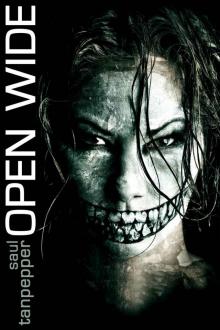 Open Wide
Open Wide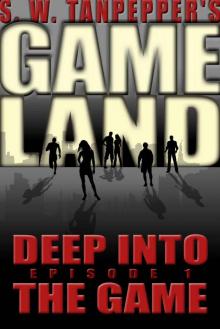 Deep Into the Game: S.W. Tanpepper's GAMELAND (Episode 1) (Volume 1) (S. W. Tanpepper's GAMELAND)
Deep Into the Game: S.W. Tanpepper's GAMELAND (Episode 1) (Volume 1) (S. W. Tanpepper's GAMELAND)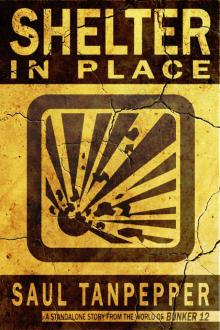 Shelter in Place: A short story from the world of BUNKER 12
Shelter in Place: A short story from the world of BUNKER 12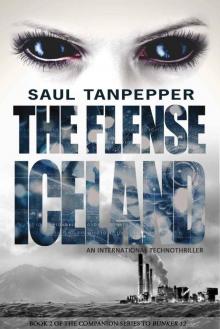 Iceland: An International Thriller (The Flense Book 2)
Iceland: An International Thriller (The Flense Book 2)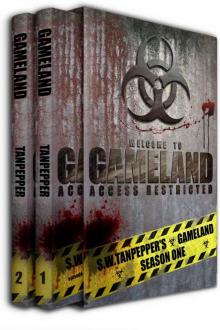 GAMELAND Episodes 1-2: Deep Into the Game + Failsafe (S. W. Tanpepper's GAMELAND)
GAMELAND Episodes 1-2: Deep Into the Game + Failsafe (S. W. Tanpepper's GAMELAND)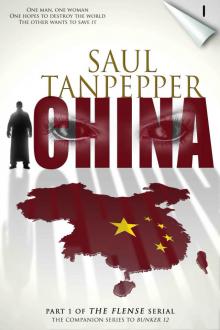 THE FLENSE: China: (Part 1 of THE FLENSE serial)
THE FLENSE: China: (Part 1 of THE FLENSE serial)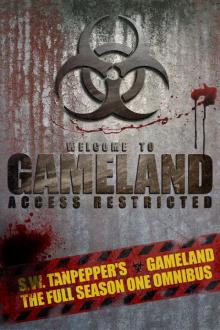 S.W. Tanpepper's GAMELAND, Season One Omnibus
S.W. Tanpepper's GAMELAND, Season One Omnibus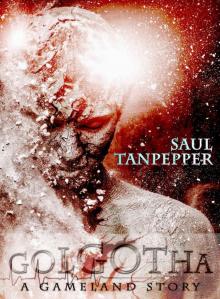 Golgotha: Prequel to S.W. Tanpepper's GAMELAND series (S. W. Tanpepper's GAMELAND companion title Book 1)
Golgotha: Prequel to S.W. Tanpepper's GAMELAND series (S. W. Tanpepper's GAMELAND companion title Book 1)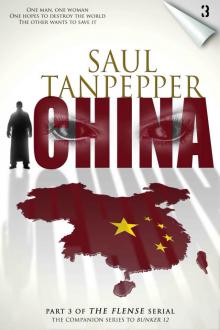 THE FLENSE: China: (Part 3 of THE FLENSE serial)
THE FLENSE: China: (Part 3 of THE FLENSE serial)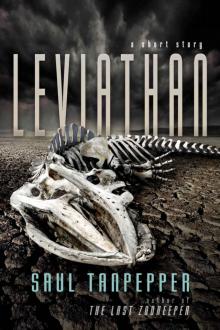 Leviathan: A Short Story About the End of the World
Leviathan: A Short Story About the End of the World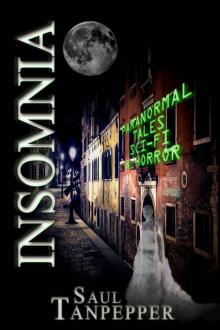 Insomnia: Paranormal Tales, Science Fiction, & Horror
Insomnia: Paranormal Tales, Science Fiction, & Horror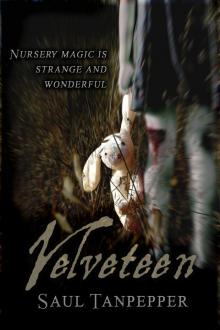 Velveteen
Velveteen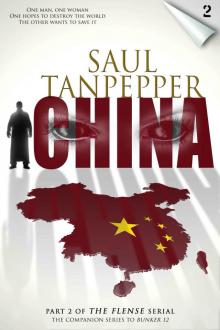 THE FLENSE: China: (Part 2 of THE FLENSE serial)
THE FLENSE: China: (Part 2 of THE FLENSE serial)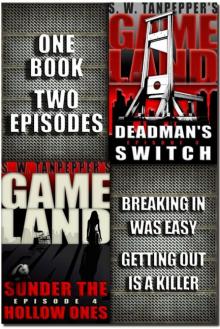 Deadman's Switch & Sunder the Hollow Ones
Deadman's Switch & Sunder the Hollow Ones